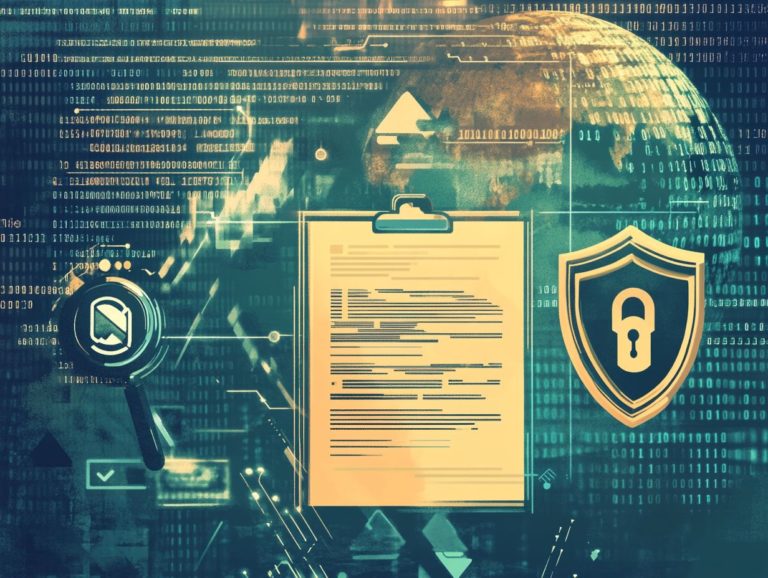the benefits of cybersecurity compliance
In today’s digital landscape, cybersecurity compliance is far more than just a buzzword it’s an essential framework for protecting your sensitive data and maintaining your business’s integrity.
Grasping what compliance involves and its significance is your first step toward fortifying your organization against cyber threats.
This article delves into the myriad benefits of cybersecurity compliance, highlighting how it safeguards your invaluable information while also helping you meet regulatory standards.
Ready to take your security to the next level? Let s dive in!
Contents
- Key Takeaways:
- Understanding Cybersecurity Compliance
- The Benefits of Cybersecurity Compliance
- How to Ensure Compliance
- Common Challenges and Solutions
- The Future of Cybersecurity Compliance
- Frequently Asked Questions
- What is cybersecurity compliance and why is it important?
- What are the benefits of being compliant with cybersecurity regulations?
- How does cybersecurity compliance help in maintaining data privacy?
- What are the consequences of non-compliance with cybersecurity regulations?
- Does cybersecurity compliance only apply to large organizations?
- How can organizations ensure cybersecurity compliance?
Key Takeaways:
Cybersecurity compliance is crucial for protecting sensitive data and preventing cyber attacks. Compliance also ensures businesses follow regulations and laws, avoiding costly fines and reputational damage. To learn more, check out what you should know about cybersecurity compliance. To ensure compliance, businesses can take proactive steps such as regular risk assessments and implementing security measures.
Understanding Cybersecurity Compliance
Understanding cybersecurity compliance is crucial for medium-sized businesses. It helps you navigate the complex regulations designed to protect sensitive data and highlights the impact of non-compliance in cybersecurity.
Adhering to regulations like GDPR, HIPAA, and PCI DSS not only secures personal information but also bolsters customer trust, reduces the risk of financial penalties, and ensures alignment with industry standards.
Frameworks like NIST and ISO 27001 provide essential guidelines that organizations must follow to maintain a strong security posture against various cyber threats. This enables operational efficiency and effective risk management.
Defining Compliance and its Importance
Compliance means following rules and standards to protect sensitive information. It helps you manage risks related to data breaches. This practice spans various frameworks, including GDPR, HIPAA, and PCI DSS, which dictate how you must handle, store, and share data.
The importance of compliance in today’s landscape cannot be overstated. Failing to meet these requirements can result in severe legal penalties, reputational damage, and significant financial losses.
You are expected to implement rigorous security protocols, undergo regular audits, and maintain clear documentation to demonstrate your commitment to these standards. Ultimately, maintaining compliance is not merely about avoiding pitfalls; it s about building trust with clients and stakeholders while ensuring that sensitive data remains safeguarded against potential vulnerabilities.
The Benefits of Cybersecurity Compliance
Cybersecurity compliance presents a wealth of advantages for medium-sized enterprises. By adhering to these standards, you cultivate enhanced customer trust, significantly reduce the risk of data breaches, and elevate your operational efficiency through the adoption of the evolution of cybersecurity compliance guidelines.
Embracing these practices not only safeguards your organization but also positions you as a leader in a landscape where security is paramount.
Protecting Sensitive Data
Protecting sensitive data is essential for your cybersecurity compliance, and it demands that you implement stringent data protection measures alongside effective risk management strategies.
By leveraging advanced encryption techniques, robust access controls, and secure cloud storage solutions, you can significantly reduce vulnerabilities and minimize the risk of data breaches.
Adopting continuous monitoring tools enables you to identify and mitigate risks in real-time. Integrating artificial intelligence and machine learning enhances your efforts, allowing you to predict potential threats and respond proactively.
Prioritizing risk management not only strengthens your defenses but also ensures you meet regulatory requirements. This fosters trust among your stakeholders and customers in today s digital landscape.
Don t wait! Start implementing these strategies today to safeguard your business.
Preventing Cyber Attacks

Preventing cyber attacks is essential for maintaining strong cybersecurity practices. You need to implement advanced security measures and stay vigilant against threats like ransomware.
Your commitment includes updating software regularly to fix vulnerabilities and using extra security steps, where you verify your identity in more than one way.
Strengthen your defenses by conducting routine security audits. These audits help identify weaknesses and ensure compliance with industry standards.
Don’t forget employee training, as human error is often a significant factor in breaches. Fostering a culture of cybersecurity awareness and encrypting sensitive data can mitigate risks and enhance resilience against evolving cyber threats.
Complying with Regulations and Laws
Complying with regulations is imperative for ensuring your organization meets cybersecurity requirements. This diligence protects sensitive information and helps avoid legal repercussions.
In today s digital landscape, adhering to regulations like the General Data Protection Regulation (GDPR), which protects personal data, and the Health Insurance Portability and Accountability Act (HIPAA) is crucial.
Aligning with these compliance mandates effectively mitigates risks and builds trust with your consumers. Ensuring compliance protects your organization from hefty fines and bolsters its reputation in a competitive market.
How to Ensure Compliance
Ensure compliance by crafting a strong compliance framework tailored to the unique needs of medium-sized enterprises online.
Key Steps to Achieve Compliance
Act now by adopting a systematic compliance process that involves regular audits and comprehensive risk assessments. Prioritize establishing clear policies that meet regulatory requirements.
Engage cross-functional teams to facilitate ongoing training and awareness programs. Routine audits act as critical checkpoints to uncover gaps and evaluate the effectiveness of your controls.
Use advanced technologies to streamline your assessment process, allowing quick responses to compliance challenges and enhancing your organization s resilience.
Common Challenges and Solutions
Medium-sized enterprises often face significant challenges in achieving cybersecurity compliance. You may navigate intricate compliance hurdles and seek effective solutions to overcome them.
Dealing with Compliance Obstacles

Overlooked compliance issues can lead to financial penalties and jeopardize your management efforts. Many challenges arise from keeping pace with evolving regulations and ensuring your team is trained in compliance practices.
Cultivate a culture of compliance through regular audits and comprehensive training programs for your employees.
Implement compliance management software to streamline requirement tracking and enhance reporting, helping you respond promptly to potential issues.
Collaborate with legal experts to strengthen your organization s resilience, ensuring long-term sustainability and safeguarding against compliance risks.
Start protecting your organization today by setting up a compliance strategy!
The Future of Cybersecurity Compliance
The future of cybersecurity compliance is evolving rapidly as new technologies change how organizations meet regulatory requirements and adapt to shifting cybersecurity laws.
Emerging Technologies and Trends
Technologies like artificial intelligence and blockchain are transforming the compliance landscape. They drive the evolution of data privacy regulations and security protocols.
Organizations are increasingly leveraging these advanced tools to meet changing legal requirements while also protecting sensitive information from breaches.
For instance, AI helps businesses automate risk assessments, allowing for real-time monitoring of compliance metrics and anomalies. This significantly reduces human error.
Blockchain, on the other hand, offers an unmatched level of transparency and immutability in record-keeping, which simplifies audit trails.
Stay vigilant as these trends evolve. Adapt your strategies to meet growing demands for enhanced accountability and trust from both regulators and consumers.
Frequently Asked Questions
What is cybersecurity compliance and why is it important?
Cybersecurity compliance means following certain rules and guidelines to protect sensitive information from cyber threats. It’s important because it helps organizations build a strong security framework, maintain trust with customers and partners, and avoid the cost of non-compliance in cybersecurity, which can lead to costly data breaches.
What are the benefits of being compliant with cybersecurity regulations?

Being compliant with cybersecurity regulations minimizes the risk of cyber attacks, protects sensitive data, prevents legal and financial penalties, and helps maintain a good reputation—check out what are the benefits of cybersecurity insurance? for more insights.
How does cybersecurity compliance help in maintaining data privacy?
Cybersecurity compliance mandates organizations to implement security measures, such as encryption and access controls. These measures protect sensitive data and ensure that only authorized individuals can access it.
What are the consequences of non-compliance with cybersecurity regulations?
Failing to comply can lead to serious legal and financial consequences, including fines, lawsuits, and damage to your organization’s reputation. It can also result in data breaches and the loss of sensitive information.
Does cybersecurity compliance only apply to large organizations?
No matter your organization’s size, understanding compliance in cybersecurity is vital for protecting your data! Small businesses and startups can also benefit significantly from adhering to cybersecurity regulations to safeguard sensitive information and maintain customer trust.
How can organizations ensure cybersecurity compliance?
Organizations can ensure compliance by regularly conducting risk assessments, implementing security policies, training employees on best practices, and keeping updated with the latest regulations and guidelines.







